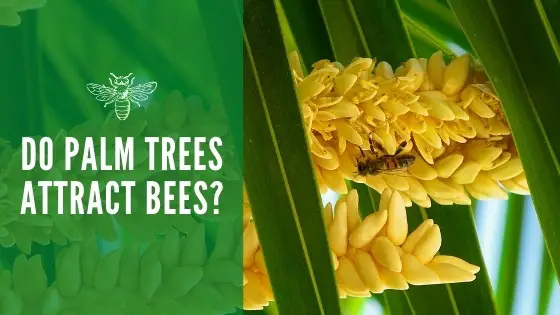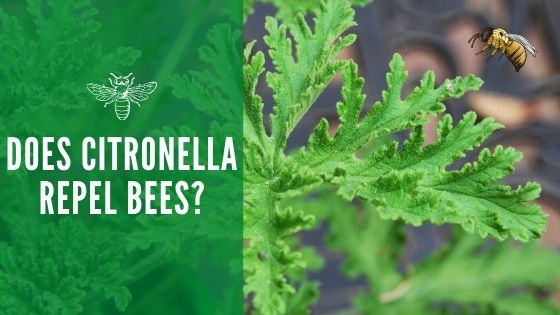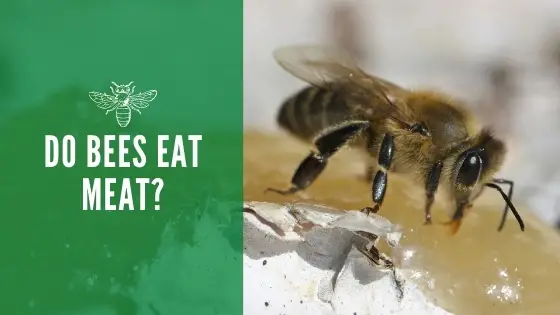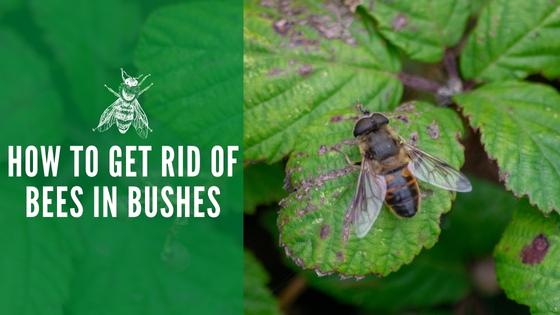Do Palm Trees Attract Bees?

Whenever you think about bees, the obvious connection is flowers. They pollinate flowers, drink the nectar, and are always buzzing around.
Several trees can attract bees. They will pollinate the flowers, live in the trees, and even eat the fruit that the tree produces. But what attracts bees to trees anyway? Also, why are palm trees so popular with them?
Why Do Bees Like Trees?
Bee pollination isn’t just about helping fields of flowers grow; but instead, it’s about all plant life. Pollinators are drawn to plants with nectar and pollen. Trees have flowers and blooms with these important nutrients too.
Most trees give off scents to attract wasps or bees to them. For example, the maple tree brings bees in with the smell of its sap, and fruit trees give off the fragrance of their fruits. Attracting a bee is a big deal for a tree because it helps them reproduce.
The Effects Of Pollination
Pollination is basically how plants reproduce. The pollen from one plant sticks to the pollinator whenever they try to drink the nectar from the flower. When they leave, that pollen is carried with them to a second flower. Some of the pollen gets into the second plant, and that is what causes more plant seeds to develop.
It’s easy to think that bees are just around to buzz, make honey, and cause the occasional sting, but without them, most of the fruits and vegetables that we eat wouldn’t be around anymore. Pollinators help out a shocking portion of the world’s food supply with reproduction every year, and without them, we’d be in trouble!
Do Bees Pollinate Palm Trees?
Yes, they do. A palm tree is no different from any other tree, and they both feed the bees with their nectar and provide a home for them.
Whenever bees land in the flowers of the palm tree, pollen sticks to them and will continue to stick as they go around the area. Bees get attracted to the flowers of the palm tree whenever it is that time of year, and they pollinate them.
While bees are very beneficial to palm trees, wasps may not be. They don’t always pollinate and instead forage on trees. They eat the sap of the palm tree or even start to harvest the tree for nesting.
Can Bees Make A Hive In Palm Trees?
They can if certain conditions are met beforehand. If a large swarm of bees is congregating around the palm tree, and the trunk is hollow, they may try to make a nest. As long as they can get in and out of the hollow space, then they will start building a home for themselves inside of your tree.
Should I Remove Bees From My Palm Tree?
If you have a palm tree in your yard or on your property that meets all the conditions needed to allow the bees to build a hive, the answer is that it depends. Removing bees from palm trees isn’t that complicated, especially with the help of a trained exterminator. However, you do need to make sure that it is worth it.
Do you have any young kids or pets who are at risk of being stung? If you do, or people in your family are all allergic to bee stings, then there’s a danger that necessitates the removal of the hive. However, if the answer is no, then why not keep them?
They can be very beneficial if you have a garden on your property because they will continue to pollinate your flowers and the palm tree itself. Additionally, there are plenty of natural ways to repel bees and keep them away from your home. Use essential oils, use a fan, and install screens on your patio.
Pollination is extremely important for the world’s ecosystem, and a big part of that is the pollination of palm trees. Don’t be afraid if you are walking near palm trees and end up seeing a few bees buzzing about because chances are they are in the process of pollenizing the flowers!



